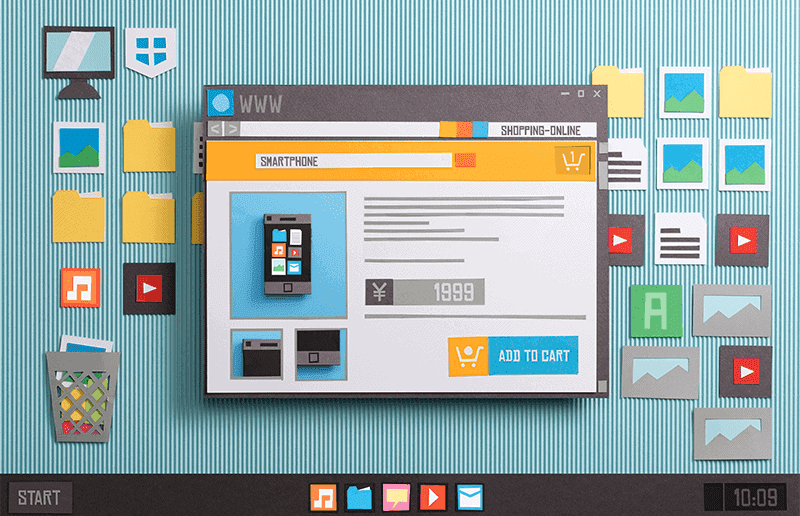What is a web app? Definition & examples
The term “app” has been an integral part of our society for many years. It refers to software that has become popular through the use of mobile devices. But what is a web app? These are applications that are called up in the browser. In general, apps fill mobile phones with a wide variety of functions and are used by billions of users every day. No wonder the market has been flooded with innovations and new possibilities for years.
Apps enable the individualisation of device use and are therefore an important part of modern digitalisation. What most consumers understand by apps are native apps. But what is a web app and how does it differ from a native app? You can find out in the following article about web apps.
What is a web app?
The web app is an application that is provided via a server (e.g. a cloud) and can be accessed in the browser of any end device. It extends the functionality of desktop computers, tablets and smartphones. Web apps are usually based on HTML, CSS or JavaScript.
Unlike native apps, they do not need to be installed as they work exclusively via the browser. It is still possible to create shortcuts on the desktop. Above all, they can be accessed on all operating systems and devices that have a web browser supported by the web app.
This makes it possible to develop a single web application for all platforms and browsers. The provider of a web application can implement updates to the software at any time without any further problems. All users therefore always use the latest and most secure version.

Normally, web applications must always be connected to the internet in order to be used. However, the caching function with HTML5 has made it possible to use web apps without a permanent internet connection. These and other developments are making the use of a web-based app increasingly attractive.
Web apps are roughly divided into two different types:
- Small web apps: Instant messaging services or Office packages
- Large web apps: graphics software or browser games
The function of web app application software becomes even clearer when compared with conventional native apps.
Differences between web app and native app
In comparison, a web app cannot achieve the complexity of a native app. Due to the lower effort involved, the costs are usually also lower than those of a native app. Especially if a company wants an app for several platforms: as a web app only has to be created once across all platforms, the overall costs are much lower than if several apps had to be created.
What is a native app?
Native apps are applications whose production is limited to one target platform only. This means that mobile apps that are produced for iOS, for example, cannot be downloaded to Android.
This means that developers* have to programme several applications in order to have a broad base on the various operating systems. On the other hand, the development and optimisation of native apps can be ideally tailored to the respective platforms. The storage space of the various end devices can be ideally utilised.
Native apps are therefore usually more complex applications. Closing security gaps is somewhat more complicated with native apps. They can only be implemented by downloading the latest version. Users may therefore be using outdated and insecure versions.

It is possible to design a software application as a native app or web app. But what are the differences between them and when does which type of app actually make sense? The function and objective of the application are usually decisive in this decision.
This table shows you the differences:
| Web App | Native App | |
|---|---|---|
| Platform | Cross-platform (all platforms that have a web browser) | Dependent on platform (IOS, Android, etc.) |
| Data storage | In most cases on a web server | On the user’s end device |
| Using the function of the device | Usually no access to the function of the device | Full access |
| Source of supply | Website | Download via App Store |
| Installation | No | Yes |
| Updates | Provider implements updates themselves and are therefore immediately available to the user | Must be installed independently |
| Internet connection | Necessary, except when caching is possible with HTML5 | Usually not necessary
|
| Costs | Usually less expensive than a native app | Usually higher costs due to the higher production costs |
Many companies cover both types of apps with their programs and services. They offer both web applications and native apps.
Differences between web app and website
Web applications and websites differ most in their content. A website usually has an informative function. It is static and does not have much room for interaction or individual services.
Web apps, on the other hand, are always action-oriented. They usually have interactive elements and provide the user with a certain service. Users use the software for a specific purpose or there is the option of making transactions or requesting services.
While a website can be created relatively quickly using a content management system such as WordPress, a web app always requires extensive programming by web developers from a web development agency. In general, however, it can be said that the boundaries between web apps and conventional websites are often blurred.

Examples of popular web apps
Well-known services such as Google Maps, Gmail or the Google search engine fall into the category of web applications. Here are a few web app examples:
- Amazon (Onlineshop, Amazon Video, Amazon Music)
- eBay (both the online auction portal and the classified ad service)
- Microsoft Office Online
- Danceflavors
Due to their simple and platform-independent use, lower costs and less complicated production, web apps are increasingly taking over the market and will therefore continue to be an important component of web applications in the future.
Getting started together
You have the vision, we have the expertise! At Platri IT, we transform your app ideas into digital masterpieces. Our team of highly skilled developers and creative minds are ready to bring your app dreams to life.
Whether iOS, Android or cross-platform, we deliver innovative, user-friendly solutions that will delight your target audience. Start your app project today with Platri IT as a strong partner at your side!


Do you have more questions about Web App?
You can reach us from Monday to Friday between 9:00 am and 5:30 pm. We look forward to hearing from you!
info@platri.de
Phone
0234 497 014 47
Do you have any further questions about our article, this topic or app development costs at Platri IT? Then please get in touch with us. If you are interested in a job at Platri IT, we look forward to your visit to our career portal. We look forward to hearing from you!

